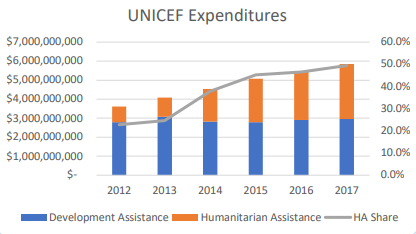According to the 2018 UNICEF Humanitarian Action for Children (HAC) report “UNICEF collaborated with a total of 1,403 civil society partners in the field for its humanitarian programming, nearly 67 per cent of whom were national partners. More than US$575 million in assets (cash plus value of supplies) were transferred from UNICEF to its civil society partners during the year, including US$308 million (54 per cent) to national civil society partners.

Partnership is crucial to UNICEF and civil society organizations, including national and international non-governmental organizations (NGO), community-based organizations (CBOs) and academic institutions. A recent study undertaken by the International Council of Voluntary Agencies (ICVA) 1 highlighted that NGOs generally highly appreciate partnering with UNICEF. This partnership receives a specific significance in humanitarian settings, where the challenges faced in delivering results for children are even more serious. Below are two charts showing the increasing share of humanitarian assistance in UNICEF activities (chart 1) and the share of financial transfer to Implementing Partners (IP) that goes to Civil Society Organisations.
“Whatever the challenge, UNICEF’s focus has always been on achieving results – tangible results that save children’s lives and create new opportunities for young people to fulfil their potential. Our ambitious new Strategic Plan will help us achieve even greater results as we work with our partners to attain the 2030 Sustainable Development Goals.”
UNICEF Executive Director H. Fore, UNICEF Strategic Plan 2018-2021
Considering the importance of this partnership, it is vital that an ongoing dialogue exists between UNICEF and humanitarian NGOs. So what are the best aspects of UNICEF’s partnerships with NGOs? UNICEF presence in the field is strong and is supporting sound analysis of the context, including the political environment, and this helps NGOs in structuring interventions. UNICEF’s voice in advocacy makes a difference - UNICEF is listened to by the national/local authorities.
To further strengthen UNICEF/NGO partnerships, UNICEF needs to address the following issues:
- Heavy bureaucracy for the negotiation of the PCAs
- The PCA guidelines and UN Partnership Portal are not clear and interpreted differently between COs (and sometimes even within the same CO)
- UNICEF’s financial support for partners is not realistic
- Limited effort by UNICEF to build relations with NGOs on an equal basis
Advocacy to and with UNICEF in support of key humanitarian issues and the rights of affected people, and humanitarian actors should be strengthened. This critical influencing and advocacy work will require deliberate and ongoing coordination of policy and advocacy activities across the humanitarian community, including clear and consistent messaging, strong and active linkages between global, regional and local engagement, and collaboration across NGO and UNICEF offices on topics where there is potential for alignment and synergy.